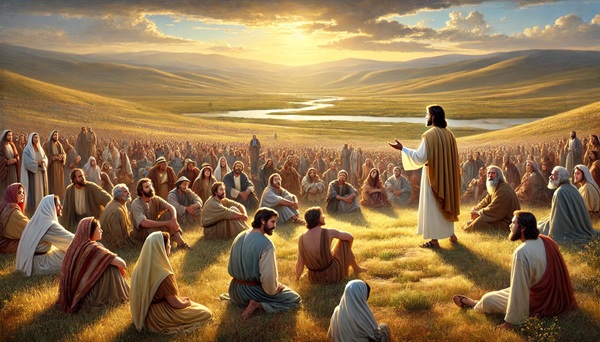
Sermon on the Plain
ChatGPT-4o/DALL-E3, 2025-02-11
My dear friends,
Luke 6:17-26, famously known as "The Sermon on the Plain," begins as follows:
and stood on a level place,
with a great crowd of his disciples
and a great multitude of people
from all Judea, Jerusalem,
and the coast of Tyre and Sidon.
They had come to hear him
and to be healed of their diseases;
and those who were troubled
with unclean spirits were cured.
And all in the crowd were trying to touch him,
for power came out from him
and healed all of them.
Then he looked up at his disciples and said:...
Here we observe Jesus, the embodiment of compassion, amidst the crowd. We must pay attention to the equality depicted here: Jesus descends and stands on level ground with the people, in contrast to the much longer "Sermon on the Mount" in the Gospel of Matthew. He preaches to a diverse audience from a position of solidarity, not from an elevated place. This shows us that compassion and understanding are universal principles, transcending the boundaries of status, power, class, race and geography.
Let's see what we can learn by comparing some of the Beatitudes from the Sermon on the Mount with the corresponding blessings and woes from the Sermon on the Plain.
- Matthew 5:3
Blessed are you who are poor, for yours is the kingdom of God.
But woe to you who are rich, for you have received your consolation.
- Luke 6:21,24
Material wealth is not a guarantee of happiness or spiritual fulfillment. It is in the recognition of our spiritual poverty, our need for inner peace and fulfillment, that we begin the journey to spiritual wealth. Conversely, those who are rich but neglect their inner growth have received only temporary consolation. This encourages us to always balance material prosperity with spiritual richness, to ensure a holistic approach to happiness.
- Matthew 5:6
Blessed are you who are hungry now, for you will be filled.
[But] Woe to you who are full now, for you will be hungry.
- Luke 6:21,25
This metaphor of hunger and thirst signifies a deep yearning for moral and ethical living, for justice and right conduct. It emphasizes the need to nourish ourselves not only with physical food but also with the food of righteousness and virtue. Those who are already full, satisfied with their unrighteous deeds, will one day hunger for justice and righteousness, but it may be too late. This is a reminder for us to continually seek out ethical nourishment in our daily lives.
- Matthew 5:4
Blessed are you who weep now, for you will laugh.
[But] Woe to you who are laughing now, for you will mourn and weep.
- Luke 6:21,25
Life is marked by moments of joy and sorrow. Yet in the midst of grief, there is the promise of comfort and even laughter. And for those who find themselves in uncontrolled laughter and joy without reflection, there may come a time of mourning and weeping. This teaches us the principle of impermanence and encourages us to cultivate equanimity in both joy and sorrow.
and utter all kinds of evil against you falsely on my account.
Rejoice and be glad, for your reward is great in heaven,
for in the same way they persecuted the prophets who were before you.
- Matthew 5:11-12
Blessed are you when people hate you,
and when they exclude you, revile you, and defame you
on account of the Son of Man.
Rejoice in that day and leap for joy, for surely your reward is great in heaven;
for that is what their ancestors did to the prophets.
[But] Woe to you when all speak well of you,
for that is what their ancestors did to the false prophets.
- Luke 6:22-23,26
This passage brings a message of hope for those who face persecution and false accusation for standing up for truth and justice. It reassures us that, just like the prophets of old, we will find reward for our endurance. This is not to encourage a craving for rewards, but a recognition that spiritual fulfillment often comes from standing up for what is right, even in the face of adversity. Yet, those who compromise their integrity for the sake of false praise will find themselves in spiritual poverty. This passage serves as a call to steadfastness and integrity in our spiritual journey.
These passages reflect a fundamental principle of Buddhist teachings - that true happiness and fulfillment come not from external conditions but from the inner peace and righteousness we cultivate in our hearts. May these teachings guide us in our journey towards deeper understanding, compassion, and fulfillment.